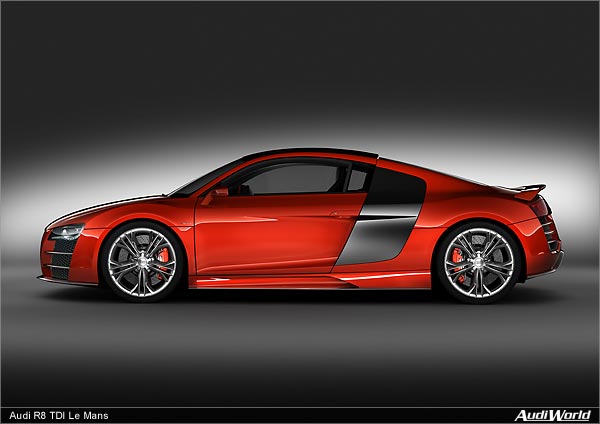Audi R8 TDI Le Mans: Chassis

The study car, too, has the innovative dampening technology known as Audi magnetic ride. This adapts the chassis characteristic to the profile of the road and the driver’s style within milliseconds.
Ceramic Brakes with Extreme Reserves
A generously dimensioned brake system supplies the necessary braking force. It applies a total of 24 pistons to the four brake disks, combining excellent performance with minimal weight and high durability. The disks are made from carbon fiber reinforced ceramic, a material that has repeatedly proven its worth in the aviation and aerospace sectors. The basis is very hard, frictionally resistant silicon carbide, with its diamond-like crystalline structure. Embedded in it are high-strength carbon fibers that absorb the stresses occurring in the material. The intricate geometry of cooling ducts in the ventilated disks prevents extremely high temperatures. The ceramic brake disk ring is bolted by 10 spring-loaded elements to a stainless steel central element that acts as the connection with the wheel’s hub.
The ceramic brakes are identifiable at a glance by the special red, six-piston monobloc aluminum calipers and the fixed calipers at the rear. The advantages of the ceramic brakes include a further reduction in weight of around 20 kilograms (44.09 lbs.), which in this case improves the handling characteristics and comfort. The high abrasion resistance permits an operating life of up to 300,000 kilometers (186,411 miles). Their key strength, however, is their ability to withstand very high loads. Even on the racetrack, for example, the ceramic brakes always maintain their full reserve performance.
Vorsprung durch Technik: Diesel Milestones from Audi
Audi has reached another milestone in diesel technology with the new V12 TDI. The brand with the four rings has been performing vital pioneering work in this area for the past three decades. The first TDI auto engine made its debut in 1989. The 2.5 liter five-cylinder power unit developed 88 kW (120 hp) and 261 Nm, catapulting diesel driving into an entirely new dimension.
This was followed in 1994 by a development version generating 103 kW (140 hp). This engine was optionally available with all-wheel drive – the first TDI quattro model. A new four-cylinder diesel appeared at that time in the Audi 100 and Audi 80, the 1.9 TDI developing 66 kW (90 hp) that has now become legendary.
At the end of 1995 the output of this four-cylinder unit rose to 85 kW (115 hp) with the advent of pump-injector fuel injection. Slightly more than one year later, at the start of 1997, the world’s first 2.5 V6 TDI appeared.
With four valves per cylinder, it achieved an output of 110 kW (150 hp), and its top speed of 220 km/h (136.70 mph) made the Audi A8 the fastest production diesel on the market. The first eight-cylinder TDI followed in 1999 – a V8 engine with a 3.3 liter capacity. The 3.0 TDI made its debut early in 2004 as the first V6 diesel with inline piezo injectors in the common rail system.
The 4.2 liter TDI launched in the A8 in 2005 is currently at the vanguard of Audi’s TDI range. One in three A8 buyers in Germany chose this V8 engine. The next logical step was to make the V8 TDI available in the Audi Q7 in summer 2007.
With extremely clean, ultra-low emission technology, Audi is continuing its tradition of leadership in diesel engine technology. In 1989 it was the Ingolstadt brand that developed direct injection technology. Since then the diesel engine has become around 30 percent more efficient.
The Euro 4 European emission standard has reduced particulate emissions for cars by 93 percent. Long before it came into force, Audi had models on the market that met this standard, even without a particulate filter. And the brand will be offering the world’s cleanest diesel engines in production vehicles in 2008. The TDI engines with the ultra-low emission system will be the first in the world to meet the forthcoming EU 6 emission standard as well as the toughest known statutory limits that apply in the U.S.
|
